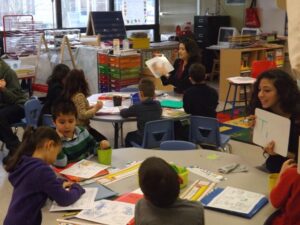Every Saturday morning during the school year, 150 young students from all over southeast Michigan, along with their parents, head to Bach Elementary School, settling in for a day of laughter and learning in Spanish—the language their families speak at home. The free program, called En Nuetra Lengua (ENL), was started by U-M faculty members Teresa Satterfield, José R. Benki and Sandra Nuñez in 2010 and is designed to help young children gain competency in Spanish, assist their families in navigating the U.S. educational system and foster pride in their cultural heritage.
“My inspiration for ENL was both professional and very personal,” says Satterfield. “I’m a linguist. My work centers on bilingual language acquisition and so I’m naturally fascinated with how young children manage to acquire, organize and maintain two or more languages. And personally, as an immigrant child once myself, I very much see myself in the children that our program reaches.”
The goal, says Satterfield, is to engage teachers, students and their families to support life-long bilingual learning and to develop students’ comprehension, reading and writing skills in Spanish. Satterfield and her colleagues say that being proficient in the language spoken at home fosters creativity and helps students gain the ability to overcome challenges. Additional research has also shown that bilingual children who are literate in both languages perform better educationally than their peers.
 “In Washtenaw County, Latino students represent the most rapidly growing demographic and face the most significant educational and economic barriers,” says Satterfield. “Despite local school attempts to support these learners, the demand for student services vastly exceeds capacity and these students and their parents typically fall through the cracks of the system.”
“In Washtenaw County, Latino students represent the most rapidly growing demographic and face the most significant educational and economic barriers,” says Satterfield. “Despite local school attempts to support these learners, the demand for student services vastly exceeds capacity and these students and their parents typically fall through the cracks of the system.”
En Nuestra Lengua helps bridge that gap by offering weekly information sessions and helping parents develop home practices that complement classroom learning. ENL also has a research component, which investigates bilingual language acquisition, along with a range of other topics focused on the intersection between bicultural and biliterate children and public health, education, psychology and more.
ENL’s program is immensely popular, with a waitlist of over 100 families for the 2017-18 school year. It’s also had considerable success: 85% of ENL’s students are reading at their grade level or better in Spanish and more than 95% of them read at their grade level or better in English, too.
“The ENL program has already been a catalyst for changing parent behaviors in the local Latino community, helping these parents connect and advocate for their child in the daily school,” says Satterfield. “It has also promoted awareness among public school educators who interact daily with the Spanish-speaking children and observe the positive effects of those who participate in our Saturday school.”
“You can recognize the Spanish school children immediately, they have such confidence and pride in their work,” one long-time Ann Arbor Public School elementary teacher told Satterfield.
By Rachel Reed
LSA Public Relations Specialist

